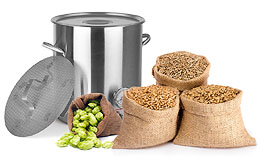 All-grain brewing is the closest thing to being a professional brewer. If you’re already brewing with malt extract, advancing to all-grain means that you need to learn how to mash, i.e. extract fermentable sugars from barley malt by mixing the grains with hot water. To do this effectively, you’ll need to add a few pieces to your existing home brewery:
All-grain brewing is the closest thing to being a professional brewer. If you’re already brewing with malt extract, advancing to all-grain means that you need to learn how to mash, i.e. extract fermentable sugars from barley malt by mixing the grains with hot water. To do this effectively, you’ll need to add a few pieces to your existing home brewery:
- All-in-one Electric Brewing Systems – The easiest way to All-Grain brew, all-in-one electric brewing systems cut down on brewing equipment and declutter your brew cave. Choose from Grainfather, Brewer’s Edge, Blichmann, or Anvil Foundry all-in-one electric brewing systems.
Custom set-ups include the following:
- Grain Mill – You can get by without one, but you will have to buy pre-crushed malt (or borrow a mill from a friend!)
- A large pot for heating water. Professional brewers call this a hot liquor tank. You will need to heat mash water and then sparge water. Larger is better, so you can heat all the water you need at once. Also, keep in mind that the larger the pot, the easier it is to brew larger batches later on. A 5-8 gallon kettle will work for a 5 gallon batch of brew.
- A mash tun – Mashing requires 1-1.5 qts of water per pound of grain. A typical 5 gallon batch of homebrew uses 10-12 lbs. of grain, plus you need to account for the grain itself. At the very least, you’ll need a 20 qt (5-gallon) brewpot, but the larger the better. Some brewers like to build their own mash tuns from a large water cooler, but we sell Cooler Mash Tuns specifically designed for brewing.
* If you play your cards right, you could move wort from the mash tun back to the hot liquor tank for the boil, but many brewers prefer to have three separate vessels.
- Brew Kettle – You will need a large kettle to boil your wort. Keep in mind that over the course of a 60-minute boil, you’ll probably evaporate 20% or more of your wort volume. You also don’t want the wort to go to the top of the kettle and burn. If you want to end up with 5 gallons of wort, you need a kettle that holds at least 8 gallons.
- Gas Burner – You can try to heat your sparge water and boil your wort on a stove-top, but most all-grain brewers also have a burner.
- Wort Chiller – Beginning homebrewers might get by with an ice bath in the kitchen sink, but if you need to cool 5 gallons of boiling wort, an immersion or counterflow wort chiller makes things much easier. Depending on the temperature of the cold water going through the chiller, these can chill wort to pitching temperature in 15-20 minutes.
- Testing Equipment – You will want a pH meter to monitor the acidity in your wort, a thermometer to monitor the temperature, and a hydrometer or refractometer to measure your gravity (sugar level) during fermentation.
- Brewing Salts – Gypsum and Calcium Carbonate will help adjust mash pH.
There are about as many different homebrew setups as there are homebrewers, but these are some of the minimum requirements for all-grain brewing. From there, you can easily customize your setup with countless doo-dads and gizmos. If you’re looking for ways to save a little money, time, and space consider the Brew-in-a-Bag (BIAB) technique.
